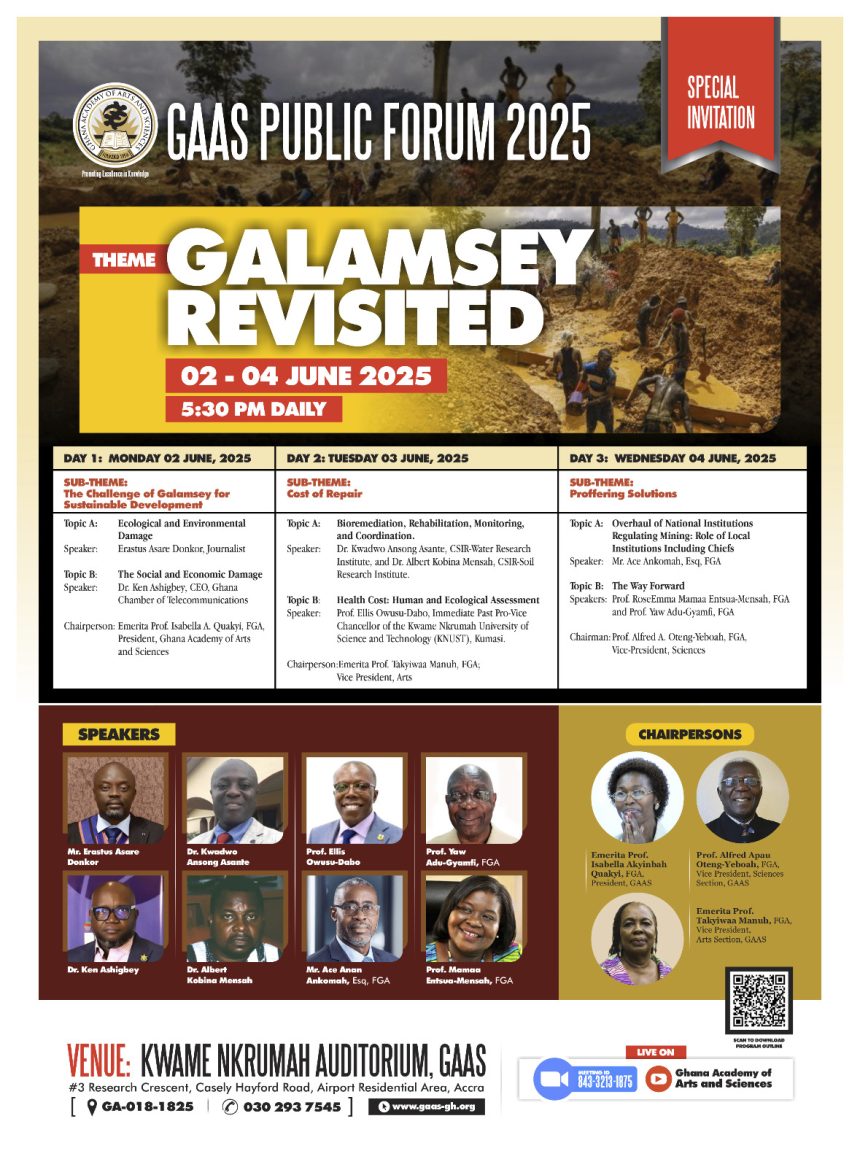The Ghana Academy of Arts and Sciences has concluded a three-day public forum under the theme “Galamsey Revisited”, aimed at reassessing the dire impacts of illegal mining and identifying sustainable solutions. Held from June 2 to June 4, 2025, the event convened high-profile officials, experts, and concerned citizens to deliberate on the galamsey crisis.
On the second day, discussions focused on the sub-theme “The Cost of Repair”, highlighting strategies such as bioremediation, land rehabilitation, environmental monitoring, and inter-agency coordination.
Principal Research Scientist at the Council for Scientific and Industrial Research (CSIR) – Water Research Institute and Head of the Environmental Chemistry and Sanitation Engineering Division at the Institute, Dr. Kwadwo Ansong Asante, opened the session with a presentation on the toll of illegal mining (galamsey) on Ghana’s water bodies. He revealed that approximately 60% of Ghana’s rivers, especially in the southwest, have been heavily polluted with toxic substances such as mercury and cyanide. These pollutants, he explained, not only poison aquatic life but also contaminate the food chain and complicate water treatment processes.
Citing rivers like the Pra and Ankobra, Dr Asante noted that high turbidity levels have forced treatment facilities to use more chemicals and electricity, significantly increasing operational costs. He estimated that rehabilitating the Pra Basin alone could cost over 48 billion Ghana cedis.
While advocating for bioremediation and vegetation restoration along riverbanks, he warned that without political will and sustainable livelihood alternatives for miners, such efforts might fail. He emphasized that, if illegal mining were halted, some rivers could naturally recover within three to five years, although chemical residues may persist longer.
Research Scientist at the CSIR-Soil Research Institute, Dr. Albert Kobina Mensah further highlighted the environmental costs. He acknowledged that informal mining contributes up to 40% of Ghana’s gold revenue and supports 1 to 4 million livelihoods but argued that the environmental damage outweighs the benefits.
“Entire landscapes have been degraded, rivers have become toxic, and the soil’s fertility has been severely compromised,” he said. Drawing on personal experience from his hometown, Piasia, Dr. Mensah shared how once drinkable rivers have turned into polluted sludge. He also raised concerns about mercury bioaccumulation in fish, which poses serious health risks to humans.
Immediate Past Pro-Vice Chancellor of the Kwame Nkrumah University of Science and Technology (KNUST), Prof. Ellis Owusu-Dabo, addressed the health implications in a lecture titled “Health Cost: Human and Ecological Assessment.” He revealed that communities exposed to heavy metals such as mercury and arsenic face heightened risks of kidney failure, neurological disorders, and birth defects.
He also warned that abandoned mining pits serve as mosquito breeding grounds, increasing malaria cases, while deforestation pushes humans closer to wildlife, raising the likelihood of zoonotic diseases like Ebola and COVID-19. Beyond physical health, Prof. Owusu-Dabo cited rising cases of drug abuse, sexual exploitation, and mental health issues in galamsey-affected communities.
He called for a holistic national response involving environmental regulation, health surveillance, education, and robust law enforcement. “Galamsey is not just an environmental issue, it is a human tragedy unfolding slowly but surely,” he stated.
During an open discussion, participants raised concerns about the safety of groundwater and rainwater in communities affected by illegal mining. In response, experts emphasized the need for skills training in environmental health, stronger anti-corruption measures, and the promotion of critical thinking education as part of a broader strategy to address the crisis.
The forum concluded with a consensus on the urgent need for research into effective remediation strategies, community education, and systemic reforms to combat the galamsey menace sustainably.
–
Story by: Cindy Selasi Humade| univers.ug.edu.gh





